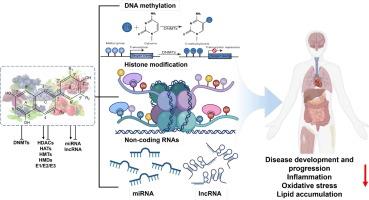Anthocyanin-mediated epigenetic modifications: a new perspective in health promoting and disease prevention
IF 13
1区 综合性期刊
Q1 MULTIDISCIPLINARY SCIENCES
引用次数: 0
Abstract
Background
Epigenetic modifications play a pivotal role in the onset and progression of various diseases and are closely related to diet and environmental factors. Anthocyanins, a common dietary polyphenol, possess the potential to promote human health, serve as promising epigenetic modulators.Aim of review
This review summarizes recent advancements in the role of anthocyanins in health promoting and disease prevention through the modulation of epigenetic modifications, focusing on clinical trials as well as in vivo and in vitro studies. It comprehensively explores the primary functions, specific mechanisms, challenges, and future perspectives of anthocyanins as epigenetic modulators, particularly in the context of DNA methylation, non-coding RNAs (ncRNAs), and histone modifications.Key scientific concepts of review
Anthocyanins-mediated epigenetic modifications primarily influence genome stability, regulate gene expression, and modify chromatin structure, thus contributing to disease prevention and intervention. Anthocyanins are shown to impact DNA methylation patterns, maintaining homeostasis and alleviating abnormal DNA methylation in disease states. Regarding ncRNAs, anthocyanins alter the expression of miRNAs and lncRNAs, thereby modulating transcriptional repression or activation to mitigate the severity of diseases. Beyond DNA methylation and ncRNAs, anthocyanins also regulate histone modifications, promoting health and preventing disease by alleviating the abnormalities of histone-modifying enzymes. The development of targeted delivery systems for anthocyanins, the exploration of the anthocyanins-gut microbiota-epigenetics relationship, the investigation of anthocyanins’ effects on intergenerational inheritance, and attention to dietary patterns rich in anthocyanins are crucial areas for future research. Moreover, more extensive and effective clinical trials are needed to facilitate the broader application of anthocyanins in epigenetic-related diseases.

花青素介导的表观遗传修饰:促进健康和疾病预防的新视角
遗传修饰在各种疾病的发生和发展中起着关键作用,与饮食和环境因素密切相关。花青素是一种常见的膳食多酚,具有促进人体健康的潜力,是一种有前途的表观遗传调节剂。本文综述了近年来花青素通过调节表观遗传修饰促进健康和预防疾病的研究进展,重点介绍了临床试验以及体内和体外研究。它全面探讨了花青素作为表观遗传调节剂的主要功能、具体机制、挑战和未来前景,特别是在DNA甲基化、非编码rna (ncRNAs)和组蛋白修饰的背景下。花青素介导的表观遗传修饰主要影响基因组的稳定性,调控基因表达,修饰染色质结构,从而起到疾病预防和干预的作用。花青素被证明影响DNA甲基化模式,维持体内平衡并减轻疾病状态下异常的DNA甲基化。对于ncRNAs,花青素可以改变mirna和lncrna的表达,从而调节转录抑制或激活,从而减轻疾病的严重程度。除了DNA甲基化和ncrna,花青素还调节组蛋白修饰,通过减轻组蛋白修饰酶的异常来促进健康和预防疾病。开发花青素靶向递送系统、探索花青素与肠道微生物群的表观遗传学关系、研究花青素对代际遗传的影响以及关注富含花青素的饮食模式是未来研究的重要领域。此外,还需要更广泛和有效的临床试验,以促进花青素在表观遗传相关疾病中的更广泛应用。
本文章由计算机程序翻译,如有差异,请以英文原文为准。
求助全文
约1分钟内获得全文
求助全文
来源期刊

Journal of Advanced Research
Multidisciplinary-Multidisciplinary
CiteScore
21.60
自引率
0.90%
发文量
280
审稿时长
12 weeks
期刊介绍:
Journal of Advanced Research (J. Adv. Res.) is an applied/natural sciences, peer-reviewed journal that focuses on interdisciplinary research. The journal aims to contribute to applied research and knowledge worldwide through the publication of original and high-quality research articles in the fields of Medicine, Pharmaceutical Sciences, Dentistry, Physical Therapy, Veterinary Medicine, and Basic and Biological Sciences.
The following abstracting and indexing services cover the Journal of Advanced Research: PubMed/Medline, Essential Science Indicators, Web of Science, Scopus, PubMed Central, PubMed, Science Citation Index Expanded, Directory of Open Access Journals (DOAJ), and INSPEC.
 求助内容:
求助内容: 应助结果提醒方式:
应助结果提醒方式:


